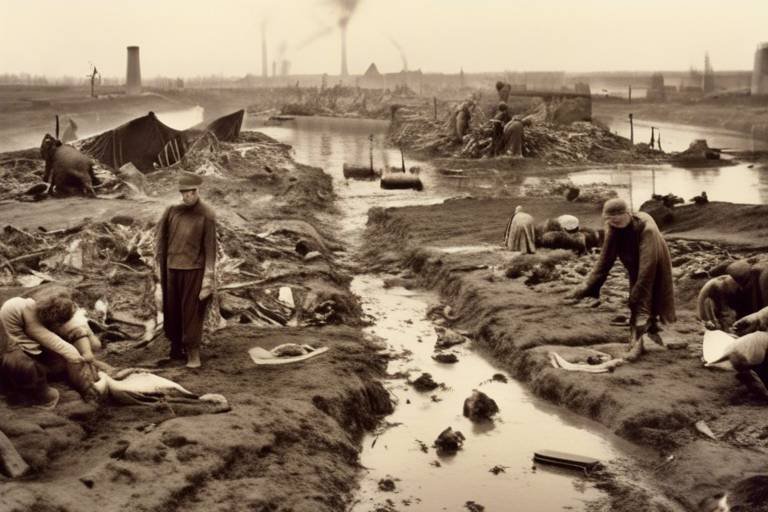The Role of Science in the Age of Enlightenment
During the Age of Enlightenment in the 17th and 18th centuries, science played a pivotal role in shaping societal progress and intellectual evolution. It was a period marked by a profound shift towards reason, empiricism, and the questioning of traditional beliefs. Scientific advancements during this era not only transformed our understanding of the natural world but also had a profound impact on philosophy, society, and governance.

Key Figures of the Enlightenment
The Age of Enlightenment in the 17th and 18th centuries was a period marked by significant advancements in science and philosophy, leading to profound changes in societal norms and intellectual discourse. At the forefront of this transformative era were key figures whose ideas and discoveries shaped the course of history.
Among these influential thinkers were luminaries such as Isaac Newton, whose laws of motion and universal gravitation laid the foundation for classical mechanics and revolutionized our understanding of the physical world. Newton's emphasis on empirical observation and mathematical reasoning set a precedent for scientific inquiry that continues to influence researchers today.
Another prominent figure of the Enlightenment was Galileo Galilei, a pioneering astronomer and physicist who championed the heliocentric model of the solar system proposed by Copernicus. Galilei's telescopic observations of celestial bodies provided compelling evidence for the Copernican theory and challenged prevailing notions of the cosmos, paving the way for a more empirical approach to science.
René Descartes, a French philosopher and mathematician, also played a crucial role in shaping Enlightenment thought with his dualistic philosophy of mind and matter. Descartes' method of systematic doubt and emphasis on rationalism laid the groundwork for modern philosophy and contributed to the development of scientific methodology.
These key figures of the Enlightenment era not only advanced scientific knowledge but also promoted reason and empiricism as fundamental principles of intellectual inquiry. Their contributions continue to resonate in contemporary scientific discourse, underscoring the enduring legacy of the Age of Enlightenment.

Scientific Revolution
The Scientific Revolution marked a significant shift in the way people viewed the natural world and the pursuit of knowledge. During this period, notable advancements in various fields of science, including astronomy, physics, and biology, reshaped understanding and challenged traditional beliefs. Scientists and philosophers began to rely on observation, experimentation, and reason to explain natural phenomena, moving away from the prevailing dogma of the time. This era saw the emergence of groundbreaking theories and discoveries that laid the foundation for modern scientific inquiry.

Copernican Revolution
The marked a significant shift in the understanding of the cosmos during the Age of Enlightenment. At the heart of this revolution was Nicolaus Copernicus, a Polish mathematician and astronomer whose heliocentric model challenged the prevailing geocentric view of the universe. By proposing that the Earth and other planets revolved around the Sun, Copernicus upended centuries of traditional beliefs about the cosmos.
This revolutionary idea not only sparked scientific inquiry but also paved the way for a new era of astronomical exploration and discovery. Copernicus's heliocentric model laid the foundation for further advancements in astronomy and physics, leading to a more accurate understanding of the solar system and the laws governing planetary motion.
One of the key implications of the Copernican Revolution was the realization that the Earth was not the center of the universe, as previously believed. This shift in perspective had profound philosophical and theological implications, challenging established notions about humanity's place in the cosmos and prompting a reevaluation of religious beliefs.
Moreover, Copernicus's work inspired future generations of scientists and thinkers to question conventional wisdom and pursue knowledge through observation and experimentation. The Copernican Revolution exemplified the power of scientific inquiry to challenge entrenched beliefs and reshape our understanding of the natural world.

Advancements in Medicine
Exploring how scientific advancements influenced societal progress and intellectual evolution during the Age of Enlightenment in the 17th and 18th centuries.
Highlighting influential thinkers like Isaac Newton, Galileo Galilei, and René Descartes who shaped scientific thought and promoted reason and empiricism.
Examining the transformative period in which new discoveries in astronomy, physics, and biology revolutionized understanding of the natural world.
Detailing how Nicolaus Copernicus's heliocentric model challenged traditional beliefs about the universe's structure and sparked scientific inquiry.
During the Age of Enlightenment, significant advancements in medicine paved the way for modern healthcare practices. Breakthroughs in medical science, such as vaccination and anatomy, revolutionized the understanding and treatment of diseases. The development of vaccines, pioneered by figures like Edward Jenner, played a crucial role in preventing deadly illnesses and improving public health. Additionally, the detailed study of human anatomy, led by scientists like Andreas Vesalius, laid the foundation for surgical practices and medical education.
Exploring how scientific developments influenced philosophical ideas, social structures, and the concept of individual rights during the Enlightenment era.
Analyzing how the emphasis on reason, liberty, and progress promoted by scientific thinkers shaped political movements and societal norms.
Examining the role of scientific institutions and publications in disseminating knowledge and fostering collaboration among scholars across Europe.
Reflecting on the enduring impact of scientific achievements and Enlightenment principles on modern science, philosophy, and governance.
Stay tuned for answers to common queries about the Age of Enlightenment and its influence on scientific thought and societal progress.

Impact on Philosophy and Society
Exploring how scientific advancements influenced societal progress and intellectual evolution during the Age of Enlightenment in the 17th and 18th centuries.
Highlighting influential thinkers like Isaac Newton, Galileo Galilei, and René Descartes who shaped scientific thought and promoted reason and empiricism.
Examining the transformative period in which new discoveries in astronomy, physics, and biology revolutionized understanding of the natural world.
Detailing how Nicolaus Copernicus's heliocentric model challenged traditional beliefs about the universe's structure and sparked scientific inquiry.
Discussing breakthroughs in medical science, such as vaccination and anatomy, that laid the foundation for modern healthcare practices.
Exploring how scientific developments influenced philosophical ideas, social structures, and the concept of individual rights during the Enlightenment era.
Analyzing how the emphasis on reason, liberty, and progress promoted by scientific thinkers shaped political movements and societal norms.
Examining the role of scientific institutions and publications in disseminating knowledge and fostering collaboration among scholars across Europe.
Reflecting on the enduring impact of scientific achievements and Enlightenment principles on modern science, philosophy, and governance.

Enlightenment Ideals
Exploring how scientific advancements influenced societal progress and intellectual evolution during the Age of Enlightenment in the 17th and 18th centuries.
Highlighting influential thinkers like Isaac Newton, Galileo Galilei, and René Descartes who shaped scientific thought and promoted reason and empiricism.
Examining the transformative period in which new discoveries in astronomy, physics, and biology revolutionized understanding of the natural world.
Detailing how Nicolaus Copernicus's heliocentric model challenged traditional beliefs about the universe's structure and sparked scientific inquiry.
Discussing breakthroughs in medical science, such as vaccination and anatomy, that laid the foundation for modern healthcare practices.
Exploring how scientific developments influenced philosophical ideas, social structures, and the concept of individual rights during the Enlightenment era.
The Enlightenment period was characterized by a profound emphasis on reason, liberty, and progress. Thinkers of this era believed in the power of human intellect to challenge traditional authority and promote individual freedoms. Concepts like natural rights, equality, and the pursuit of knowledge were central to Enlightenment ideals, shaping political movements and societal norms.
Examining the role of scientific institutions and publications in disseminating knowledge and fostering collaboration among scholars across Europe.
Reflecting on the enduring impact of scientific achievements and Enlightenment principles on modern science, philosophy, and governance.

Scientific Societies and Journals
Exploring how scientific advancements influenced societal progress and intellectual evolution during the Age of Enlightenment in the 17th and 18th centuries.
Highlighting influential thinkers like Isaac Newton, Galileo Galilei, and René Descartes who shaped scientific thought and promoted reason and empiricism.
Examining the transformative period in which new discoveries in astronomy, physics, and biology revolutionized understanding of the natural world.
Detailing how Nicolaus Copernicus's heliocentric model challenged traditional beliefs about the universe's structure and sparked scientific inquiry.
Discussing breakthroughs in medical science, such as vaccination and anatomy, that laid the foundation for modern healthcare practices.
Exploring how scientific developments influenced philosophical ideas, social structures, and the concept of individual rights during the Enlightenment era.
Analyzing how the emphasis on reason, liberty, and progress promoted by scientific thinkers shaped political movements and societal norms.
Examining the role of scientific institutions and publications in disseminating knowledge and fostering collaboration among scholars across Europe.
Reflecting on the enduring impact of scientific achievements and Enlightenment principles on modern science, philosophy, and governance.

Legacy of the Enlightenment
During the Age of Enlightenment, the impact of scientific advancements was profound, leaving a lasting legacy that continues to shape various aspects of modern society. One of the key legacies of the Enlightenment is the emphasis on reason and empirical evidence in scientific inquiry. This shift towards rational thinking laid the foundation for the scientific method, which remains a fundamental principle in scientific research today.
Furthermore, the Enlightenment era promoted the values of individual liberty, equality, and progress, which have had a lasting impact on political and social structures. The idea that all individuals have inherent rights and that society should strive for the betterment of humankind reflects the Enlightenment's influence on modern governance and human rights movements.
Scientific societies and journals that emerged during the Enlightenment played a crucial role in disseminating knowledge and fostering collaboration among scholars. These institutions provided a platform for scientists to share their discoveries, engage in intellectual debates, and contribute to the collective advancement of knowledge across Europe.
The legacy of the Enlightenment also extends to the field of philosophy, where thinkers like Immanuel Kant and John Locke further developed Enlightenment ideals and principles. Their philosophical works continue to influence contemporary philosophical discourse, particularly in areas related to ethics, metaphysics, and political theory.
Moreover, the scientific revolution that took place during the Enlightenment paved the way for significant breakthroughs in various fields, including medicine, physics, and astronomy. The discoveries made during this period laid the groundwork for modern scientific disciplines and technologies that have revolutionized the way we understand the natural world.
In conclusion, the legacy of the Enlightenment is a testament to the transformative power of scientific thought, reason, and intellectual curiosity. The principles and values championed by Enlightenment thinkers continue to shape our understanding of the world and inspire ongoing advancements in science, philosophy, and governance.
Frequently Asked Questions
- What was the significance of the Scientific Revolution?
The Scientific Revolution marked a period of profound transformation in scientific thought and understanding. It challenged long-held beliefs, particularly in the fields of astronomy, physics, and biology, leading to groundbreaking discoveries that revolutionized our perception of the natural world.
- Who were some key figures of the Enlightenment?
Notable figures of the Enlightenment include renowned thinkers such as Isaac Newton, Galileo Galilei, and René Descartes. These intellectuals played pivotal roles in promoting reason, empiricism, and scientific inquiry, shaping the intellectual landscape of their time.
- How did scientific advancements influence society during the Enlightenment?
The scientific advancements of the Enlightenment era had a profound impact on society by fostering a culture of critical thinking, challenging traditional beliefs, and laying the groundwork for modern scientific principles. These developments also influenced philosophical ideas, social structures, and political movements of the time.



















